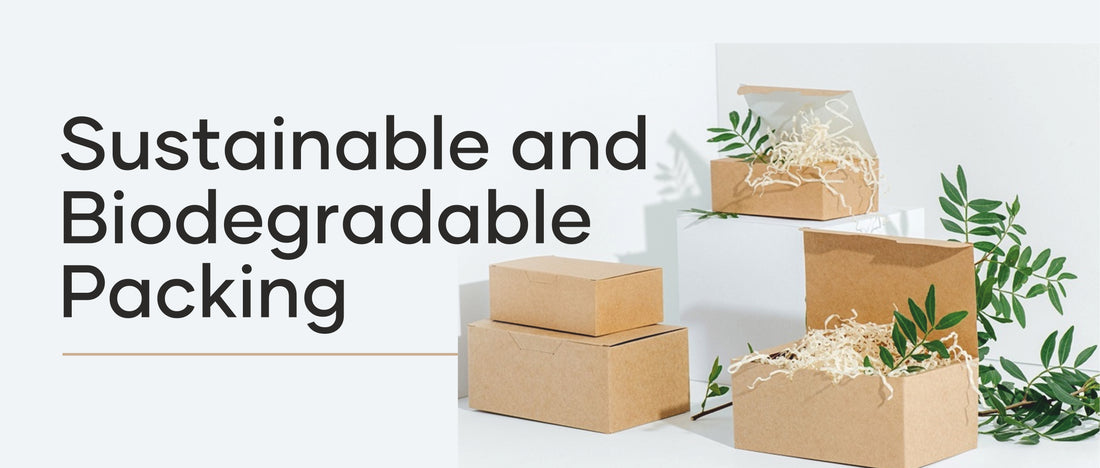
SUSTAINABLE AND BIODEGRADABLE PACKAGING: A GREEN CHOICE FOR NATURAL ORGANIC COSMETICS
Share
“Sustainable and Biodegradable Packaging: A Green Choice for Natural Organic Cosmetics”
In today’s world, the beauty industry is undergoing a significant transformation as consumers become increasingly conscious of the environmental impact of their A Green Choice. Natural organic cosmetics have gained immense popularity for their eco-friendly ingredients and ethical practices. However, the sustainability journey doesn’t end with the product itself; it extends to the packaging as well. In this blog post, we will explore the importance of sustainable and biodegradable packaging materials for natural organic cosmetics.
THE PROBLEM WITH TRADITIONAL PACKAGING
Conventional cosmetics often come packaged in materials like plastic, which have a detrimental impact on the environment. Plastic pollution is a global crisis, and the beauty industry is a significant contributor to this problem. Single-use plastics, such as lipstick tubes, mascara containers, and shampoo bottles, end up in landfills and oceans, taking hundreds of years to decompose.
A Green Choice Need for Sustainable and Biodegradable Packaging
Sustainable packaging for natural organic cosmetics is more than just a trend; it’s a necessity.
HERE ARE SOME COMPELLING REASONS WHY:
- Reduced Environmental Impact: Sustainable packaging materials have a significantly lower carbon footprint compared to traditional plastics. They require fewer resources to produce and often use recycled materials.
- Less Plastic Pollution: Biodegradable packaging materials break down naturally, reducing the risk of plastic pollution. This is especially important for marine ecosystems, where microplastics can harm aquatic life.
- Enhanced Brand Image: Brands that prioritize sustainability and use eco-friendly packaging materials often build stronger trust and loyalty with environmentally conscious consumers.
- Compliance with Regulations: Many regions and countries are implementing stricter regulations regarding packaging waste. By adopting sustainable packaging, cosmetics companies can stay ahead of compliance requirements.
- Sustainable Packaging Options: Several eco-friendly packaging materials are gaining popularity in the cosmetics industry
- Glass: Glass containers are recyclable and have a premium, elegant appearance. They are an excellent choice for serums, creams, and perfumes.
- Paper and Cardboard: Paper and cardboard packaging, often used for soap and solid cosmetics, are renewable, biodegradable, and easily recyclable.
- Biodegradable Plastics: These plastics are designed to break down naturally, reducing their environmental impact. They can be used for various cosmetic packaging, including tubes and containers.
- Wood: Wooden packaging adds a natural and rustic touch to cosmetics. Wood is biodegradable and can be sourced sustainably.
- Metal: Aluminum and steel containers are recyclable and have a long life cycle. They are suitable for products like lip balms and solid perfumes.
- Plant-Based Plastics: Derived from renewable resources like cornstarch or sugarcane, plant-based plastics are biodegradable and offer an alternative to traditional plastics.
INDUSTRY’S TRANSITION A GREEN CHOICE
The beauty industry’s transition towards sustainable and biodegradable packaging for natural organic cosmetics is a promising step in the right direction. Consumers are increasingly valuing brands that prioritize eco-friendliness, and businesses that adopt these practices not only contribute to a healthier planet but also secure their place in the evolving market.
As a conscious consumer, you can make a difference by choosing natural organic cosmetics packaged in A Green Choice materials. By doing so, you support companies that are committed to reducing their environmental footprint, one biodegradable container at a time. Together, we can protect our planet and enjoy the beauty of nature without compromise.
24cOrbelle is committed to A Green Choice packaging and encourages recycling and reuse of materials. Promoting sustainable practices and engaging with environmentally conscious consumers is a great way to contribute to a greener future.
